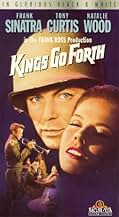Verso la fine della seconda guerra mondiale, due soldati americani che combattono nel sud della Francia iniziano una relazione sentimentale con una giovane donna americana. Il suo background... Leggi tuttoVerso la fine della seconda guerra mondiale, due soldati americani che combattono nel sud della Francia iniziano una relazione sentimentale con una giovane donna americana. Il suo background rivelerà più cose su di loro che su di lei.Verso la fine della seconda guerra mondiale, due soldati americani che combattono nel sud della Francia iniziano una relazione sentimentale con una giovane donna americana. Il suo background rivelerà più cose su di loro che su di lei.
- Cpl. Lindsay
- (as Edward Ryder)
- Jazz Musician: Trumpet
- (non citato nei titoli originali)
- Blairs' Butler
- (non citato nei titoli originali)
- Old Frenchwoman with Wine
- (non citato nei titoli originali)
- Jazz Musician: Tenor Sax
- (non citato nei titoli originali)
- Jazz Musician: Drums
- (non citato nei titoli originali)
- Jazz Musician: Vibraphone
- (non citato nei titoli originali)
- Captain Harrison
- (non citato nei titoli originali)
- Jazz Musician: Guitar
- (non citato nei titoli originali)
- Jazz Musician: Bass
- (non citato nei titoli originali)
Recensioni in evidenza
The movie is narrated, at times, by Frank Sinatra and is told from the viewpoint of his character, Sam. Sam is in charge of a unit of soldier and when they are in France, he falls hard for a gorgeous French lady (Natalie Wood). Unfortunately, this is not reciprocated as although Sam is very nice, she only sees him as a friend. Unfortunately for her, however, she soon falls for Britt (Tony Curtis)...and Britt is a grade-A heel and only is interested in using this sweet girl.
This is a very good film. However, you really wonder how much better it might have been if the studio had been brave and cast the black actress, Dorothy Dandridge in the lead (as they originally intended). I am NOT complaining about Miss Wood's performance...she was EXCELLENT as a French woman. But the idea of having an obvious interracial romance would have made the film much more interesting and brave. As it is, Wood is supposed to be biracial but she really doesn't look it...and the film loses some of its punch. But it's still a good film and well worth your time...just not quite what it could have been. Sinatra is great in the movie, by the way...really, really good. And, Curtis plays an excellent fast- talking heel. Well written and unforgettable.
I shouldn't have loved this movie as much as I did. But it touches on those basics of love and life and rivalry and goodness I couldn't help be manipulated. And it's set in Villefranche, one of my favorite places in the world, and it's set during WWII, when life for Europe was its most on fire. And there I was, crying and loving it.
"Kings Go Forth" is actually a slightly late in the game WWII flick that shifts attention at first to luxuriating soldiers in the south of France just as the war was ending. It's not as much about war (though there are some remnants of fightings which are tense). It's more about a bunch of decent guys, two of them in particular, and their misunderstandings. And it's about love. The south of France and the Mediterranean is about as decent a setting for romance as you get. It's idealizing (everyone loves the Americans in their Jeeps, which must be half true, but not entirely), and it's all sunny weather and champagne. Except that love is never easy, and it gets more and more intense, sad, and profound. Yes, profound.
Tony Curtis is terrific as usual. As Brit Harris he is charming, funny, and clever. Natalie Wood in one of many great roles between "Rebel Without a Cause" and "West Side Story" is rather perfect, except maybe her French accent. But she represents, as Monique Blair, something perfectly innocent and yet ravaged by war. The other lead, the main character Sam Loggins, is played by Frank Sinatra, and Loggins also loves Blair. At first Loggins is noble and lets Harris win the girl's heart, but then it gets complicated.
There is a fabulous last war scene for the climax, featuring a special mission needing just two men--our leads, now enemies and distrustful. But in the heat of their battle, Harris gives some real wisdom about character, and Loggins shows true compassion. It's war, the worst and the best of it. And it's the worst and best of love, too, with an ending just slightly hanging in mid-air.
Director Delmer Daves pulls off a lot of great, nicely felt films. They often lack an edge of innovation or of real probing triumph, but this is one of those that brings a lot of issues, including racism at its simplest, to a believable story. Don't brush this movie off. And don't be put off by the first twenty minutes or so when the establishing scenes seem like just another good war film. This one goes places, at least for the romantic.
Frank Sinatra narrates the story with him as one of the protagonists. He's an army lieutenant and he's just gotten some replacements for his company, one of them being Tony Curtis. Curtis is a spoiled rich kid, a real smooth operator. But he turns out to be a good soldier and he and Sinatra become friends despite Sinatra being an officer and Curtis non-com.
Then the two of them get interested in the same girl, Natalie Wood. She's an American expatriate living with her widowed mother, Leora Dana. Her father was a black man and they left the United States many years before to escape ruling prejudices. Ironic that they escape to France and then France gets occupied by the real prejudice merchants.
The film is divided equally, half of it concerning the war and half of it dealing with the romantic triangle. For the second time in his career, the first being in Sweet Smell of Success, Tony Curtis plays a heel and does it well. Curtis was really coming into his own as a player and not just a pretty face. Kings Go Forth was filmed on the heels of his Oscar nominated performance in The Defiant Ones.
Frank Sinatra gives one of his best screen performances in Kings Go Forth. None of the hipster slang, not the nebbish of his forties musicals, Sinatra plays a really good man trying to deal with his own inner conflicts about what he's been brought up to believe and the feelings he has for Wood. It's something different and Sinatra does it well.
Natalie Wood was as beautiful as they come and Leora Dana as her mother who's seen too much of the world and is determined to protect her daughter has some of her best screen moments. Tony Curtis liked working with Natalie Wood very much in the films they made together, but he does mention in his autobiography it would have really been great if someone like Dorothy Dandridge had been cast in her role. It might have made Kings Go Forth better remembered today, as much as classic as Guess Who's Coming To Dinner.
Elmer Bernstein did the film score and one of the themes was given a lyric by Sammy Cahn and became the song Monique after Natalie Wood's character. Frank Sinatra made a hit record of it though it is only heard instrumentally in the film. It's one of his loveliest ballads.
Viewers should see the film before hearing Sinatra's record of it. The whole premise of the film is the plain Sinatra and the smooth Curtis competing for Wood. You hear old Blue Eyes sing Monique and you'll find it hard to believe why he didn't just sing that song.
Why Natalie would have melted right away in his arms.
I thought Natalie Wood and Tony Curtis were just great in this movie, as was Leora Dana as Natalie's mother. Wood never received her due as an actress and I thought her French accent was just fine. Curtis is absolutely chilling in his confrontation with Dana and Wood and it is easy to understand why Sinatra would want to kill Curtis. I think Sinatra is somewhat miscast as the "ugly duckling" who pines for Wood. After all, we've all seen too many movies where Sinatra's won the hearts of girls as pretty as Wood (if there ARE any other girls as pretty as Wood). Watching the film again, I couldn't help but wonder what Charles Bronson could have done with Sinatra's role. Nonetheless, given the potentially explosive (at that time) interracial element, it is unlikely "Kings Go Forth" would have been made without Sinatra's participation. Further, the episodic structure of "Kings Go Forth" plays against the sexual tension of a love triangle. Finally, the ending is almost annoyingly noncommittal. It shouldn't be; after all, there are enough clues as to what should eventually transpire between the principals. I think, here, the problem continues to be Sinatra. He is simply too aloof and passionless.
Given my criticisms, you may be surprised to know I really like "Kings Go Forth." I give it a "7". Oh, and for the record, the French ARE, historically, a VERY racially tolerant people. Witness "Cajuns," the French and Indian War, Josephene Baker and their acceptance of Indo-Chinese Eurasian children.
Lo sapevi?
- QuizThe role of Monique was originally written with Dorothy Dandridge in mind.
- BlooperCameraderie between Sam (an officer) and Britt (an enlisted NCO whose rank goes up and down as the story unfolds), is unmilitary and unreal, particularly their calling each other by their first names.
- Citazioni
1st Lt. Sam Loggins: How do you feel about riding in a jeep?
Mrs. Blair: It's one of the several experiences I promised myself before I die. Another is jumping out of a parachute.
1st Lt. Sam Loggins: No, dear. You jump out of a plane. You hold onto the parachute.
- ConnessioniReferenced in In Person (1993)
I più visti
- How long is Kings Go Forth?Powered by Alexa
Dettagli
- Data di uscita
- Paese di origine
- Lingue
- Celebre anche come
- Kings Go Forth
- Luoghi delle riprese
- Aziende produttrici
- Vedi altri crediti dell’azienda su IMDbPro
- Tempo di esecuzione
- 1h 49min(109 min)
- Colore
- Proporzioni
- 1.85 : 1
































